[mv_video doNotAutoplayNorOptimizePlacement="false" doNotOptimizePlacement="false" jsonLd="true" key="luptb4xsoet9sqdm2w8g" ratio="16:9" thumbnail="https://mediavine-res.cloudinary.com/v1597609031/mm9ter02xgiqcqdesvip.jpg" title="Homemade Dog Food Recipe" volume="70"]
Have you ever wondered can dogs eat sweet potatoes? Well, the answer is a resounding YES! Sweet potatoes aren't only great for humans they are an excellent source of vitamins and nutrients for our 4-legged friends as well! Cubed and steamed, mashed, or sliced and dehydrated like this simple treat, there are lots of easy ways to incorporate sweet potatoes into your dog's diet.
***Please note, I am not a veterinarian, just a very passionate dog owner who once asked herself, can dogs eat sweet potatoes?! The information in this blog post documents our own personal experiences, research, and the recipes that we feed our dogs under our veterinarian’s careful supervision. Please, consult with your vet and use your own personal judgment when considering transitioning to a 100% human grade food diet for your pup. ***

Devastating News: Kidney Disease
At the end of 2019, during our yearly vet check, we received the devastating news that our 11 year old dog, Hooch's blood work showed that he was in stage 4 kidney failure! Honestly, I was a basket case, how on earth did we miss this? He seemed like he was just dealing with some symptoms of getting older – frequent urination, sometimes excessive water drinking. It definitely didn’t feel like life threatening symptoms!
As much as the diagnosis was a shock, the price tag of the prescription diet was pretty horrifying too! I immediately started researching and consulting with my vet about changing our dog to a 100% human grade diet. Would food make any difference at all? Honestly, the journey has been remarkable and the rewards have been far greater than we could have ever imagined!
At the time of that visit, the vet estimated we only had 3-6 months left with Hooch. However, the success of all of the dietary and lifestyle changes has kept him here with us for well over a year! Truly he is a different dog. He's got energy for days (he still sleeps hard) but he runs the yard like he's a puppy again. We went back for his yearly appointment and his blood level indicators for kidney disease now fall within the normal range! The miracle of real, whole foods never ceases to amaze me!

But, can dogs eat sweet potatoes?
Sweet potatoes are a great treat for all dogs, even those living with kidney disease!
Once we found our groove, there was no going back. But then one day I reached into his treat drawer and realized everything in there was processed in some way. Even the 'natural' treats had ingredients that he really shouldn't have. "Oh my God", I thought, now I have to figure out how to make homemade dog treats! I didn't want to unwind all of our progress with some store-bought goodies - even if they were his favorites.

I started googling ingredients - and of course you know what I asked first: Can dogs eat sweet potatoes?
You see, ingredients matter. Dogs with kidney disease need to eliminate as much phosphorous from their diet as possible. Bones, rawhide, organ meats, and jerky; well, they were all OUT! I ordered the only treats I could find that would work. Overpriced 1-ingredient dehydrated sweet potato treats from Amazon. I just couldn't wrap my head around how a 32-ounce bag of sweet potatoes could cost almost $30!

What about yams? Can I feed yams to my dogs?
I'm about to blow your mind here....The yams you see at your local grocery store across the United States, well they're actually sweet potatoes!
Although in the United States, sweet potatoes are often called "yams", they really aren't yams at all! A true yam is a starchy edible root and is generally imported to America from the Caribbean. It is rough, scaly, and very low in beta carotene. In supermarkets, the names “sweet potato” and “yam” tend to be used interchangeably but trust that this is just a marketing ploy. That sweet, orange-colored root vegetable that you love so dearly is actually a sweet potato. All so-called “yams” in your supermarket are in fact sweet potatoes!

Sweet Potato 101
Now that we have cleared the air and you know that a sweet potato and a "yam" are the same thing here in the U.S. let's chat briefly about sweet potatoes in general...
While sweet potatoes are called “potatoes,” they aren’t related to white potatoes at all. They come in many colors besides the more familiar orange. Sweet potatoes flesh can vary from white to orange and even purple! The different colors of sweet potato have subtly different flavors and textures ranging from super sweet to rather mild. Funnily enough, Hooch likes the Orange and Rebel prefers purple. If given a choice they stick to their colors almost exclusively. So can dogs eat sweet potatoes? Not only can they eat them - my dogs beg for them.

Sweet Potato Nutrition
The health benefits of sweet potatoes for dogs are enormous!
Dietary Fiber: Sweet potato is one of the best sources of fiber amongst vegetables, and probably the highest of the vegetables your dog will actually want to eat. A single cup of cooked sweet potato contains nearly 6 grams of fiber! Fiber is great for your dog's digestive health. It will help promote regular, healthy bowel movements, and adding a little extra to their diet can help alleviate occasional constipation and diarrhea.
Beta-Carotene: Beta-Carotene is what gives sweet potatoes their unique orange color, but it does a lot more than just lend them their hue. Beta-Carotene is a potent antioxidant that helps protect against heart disease and can reduce the risks of certain types of cancer. It also converts to vitamin A in your dog's body. Vitamin A is essential for a dog's vision, growth, muscle strength, and skin health.
Vitamins: Sweet potatoes are rich in other vitamins that can help a dog's overall health, including vitamins B6 and C. Just like in humans, vitamin C is essential for a healthy immune system.
Minerals: Sweet potatoes contain calcium, potassium, and iron. Each of these minerals contributes to the overall well being of your dog in its own way. Potassium helps to maintain a correct fluid balance in your dog's body, as well as preserving nerve transmissions and muscle function. Calcium helps to keep a dog's teeth and bones strong and healthy.
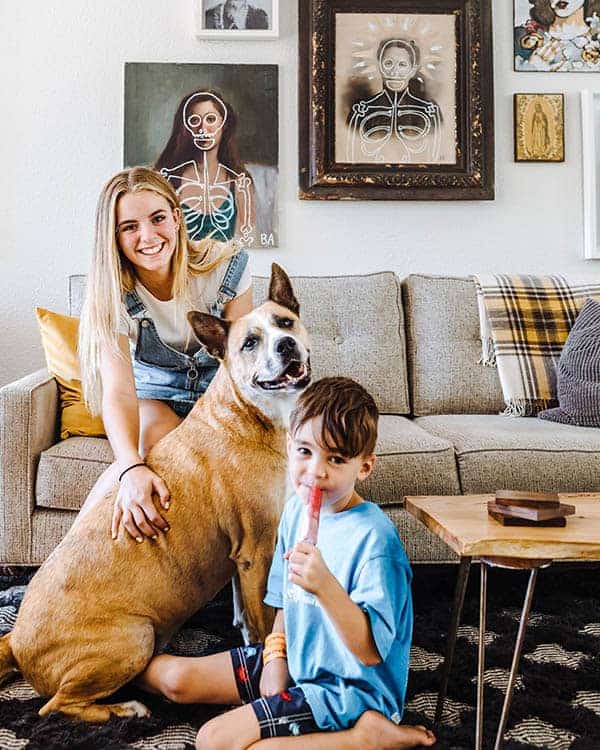
How should I prepare sweet potatoes for my dog?
There are a few ways you can prepare and feed sweet potatoes to your dog. Regardless of how you intend to prepare them it is important to always make sure that the sweet potatoes you feed your pup are cooked thoroughly and that the skin is removed. The skin of the sweet potato is much harder for your dog to digest and adds little to no nutritional value. You should also NEVER feed your dog raw sweet potatoes. Not only are they difficult to chew, but they can upset your dog’s stomach and potentially cause an intestinal blockage.
Dehydrated 1-Ingredient Sweet Potato Dog Treats
One of the most popular ways to give your dog sweet potatoes is as a dehydrated chew like these! They make a great alternative to rawhide chews, and unlike rawhide, sweet potato chews do not have a reputation for causing digestive blockages and choking. There are 2 ways to go about cooking these treats, but both start with peeling the sweet potatoes and making thick slices lengthwise like slabs. A mandolin works great for this, but a knife also works well just watch your fingers! I usually set mine to about ¼" so the chews are nice and thick.
Dehydrator Method: I make these treats SO often that we invested in a larger model dehydrator that has lots of shelves for lots of treats. I absolutely LOVE it! I have made these in our smaller dehydrator as well and it worked great, just took a few hours longer. To dehydrate in a dehydrator place the sweet potatoes in an even layer on a dehydrator rack. Make sure that there is room around each sweet potato and they aren't touching. Dehydrate for 6-8 hours at 125°F ( 52°C) until crisp. You will need to adjust the time more or less based off of how thick you slice the sweet potatoes.
Oven Method: Preheat the oven to 250°F (130°C). Line two baking sheets with parchment paper. Arrange the sweet potatoes in a single layer on the baking sheets and bake for 2 ½ to 3 hours flipping once half way through until they are shrunken, dried out, and some pieces are a bit crispy, while others are a bit chewy. The treats will crisp up a bit more as they cool.
Steamed sweet potato for dogs:
Honestly, one of the best and easiest ways to treat your dog to sweet potatoes is to steam or boil them— do not add any seasonings to though as these aren't good for our pups. Steaming helps retain more nutritional value than roasting.
- Fill the bottom of a steamer with about 2-3 inches of water.
- Peel a sweet potato and cut into small cubes that are about the same size as kibble.
- When the steamer is ready, add pieces, cover and steam for 7-10 minutes, or until the sweet potatoes are tender.

How many sweet potatoes can my dog eat?
Like with any food, moderation is key. The amount given should be based on a variety of factors, such as your dog’s size, activity level, and overall health. Most importantly, start by giving your dog a small amount. Depending on the size of your dog, start with between a teaspoon and a tablespoon, if incorporating steamed sweet potato into their meals. For our dehydrated sweet potato treats you will want to start small as well and as long as your dog's tummy responds well you can gradually move up from there. Our dogs both eat 4-5 sweet potato treats a day and LOVE them, they literally start to drool when I walk past the bag!
So there you have it! Basically everything and anything I know or have researched/asked my vet about feeding our dogs sweet potatoes! If you have any questions drop them in the comments box below. I always do my best to respond within a few days.
If you’ve made our dehydrated sweet potato dog treat recipe I would be so grateful if you would rate the recipe and let me know what you think in the comments below!
PrintDehydrated Sweet Potato Dog Treats
Don’t forget to rate the recipe and let me know what you think about our Dehydrated Sweet Potato Dog Treats recipe in the comments below, I just love hearing from you and your reviews/comments really help other people that visit This Mess is Ours!
- Prep Time: 5 minutes
- Cook Time: 6 hours
- Total Time: 6 hours 5 minutes
- Yield: 12 servings 1x
- Category: Dog treats
- Method: Dehydrator
- Cuisine: Dog treats
- Diet: Gluten Free
Ingredients
2 large sweet potatoes, scrubbed clean and peeled
Instructions
Slice the prepared sweet potatoes into thick slices lengthwise like slabs either with a very share knife or mandolin.
Dehydrator Method:
Place the sweet potato slabs/slices in an even layer on a dehydrator rack. Make sure that there is room around each sweet potato and they aren't touching. Dehydrate for 6-8 hours at 125°F ( 52°C) until crisp. You will need to adjust the time more or less based off of how thick you slice the sweet potatoes.
Oven Method:
Preheat the oven to 250°F (130°C). Line two baking sheets with parchment paper. Arrange the sweet potatoes in a single layer on the baking sheets and bake for 2 ½ to 3 hours flipping once half way through until they are shrunken, dried out, and some pieces are a bit crispy, while others are a bit chewy.
Both preparation methods will yield treats that will crisp up a bit more as they cool.
Notes
Dehydration time can take anywhere form 4-6 hours or even longer depending on what type of dehydrator you have and how thickly you have sliced the sweet potatoes.
Nutrition
- Serving Size: 1 treat
- Calories: 19
- Sugar: 0.9 g
- Sodium: 11.9 mg
- Fat: 0 g
- Carbohydrates: 4.4 g
- Protein: 0.3 g
- Cholesterol: 0 mg
I just love hearing from you! Your reviews and comments really help others that visit This Mess is Ours. Want to be a part of our online community outside of the blog? It’s easy!! All you have to do is follow @THISMESSISOURS on FACEBOOK, INSTAGRAM, TWITTER, YOUTUBE, or PINTEREST to see cooking demos, and peeks into our day to day life.
Looking for even more healthy homemade dog treat and dog food recipes? Keep scrolling for more!!!
Clearly, the answer to the question, can dogs eat bananas? Is a resounding YES! But, did you know that your dog can eat other types of fruits and vegetables also?
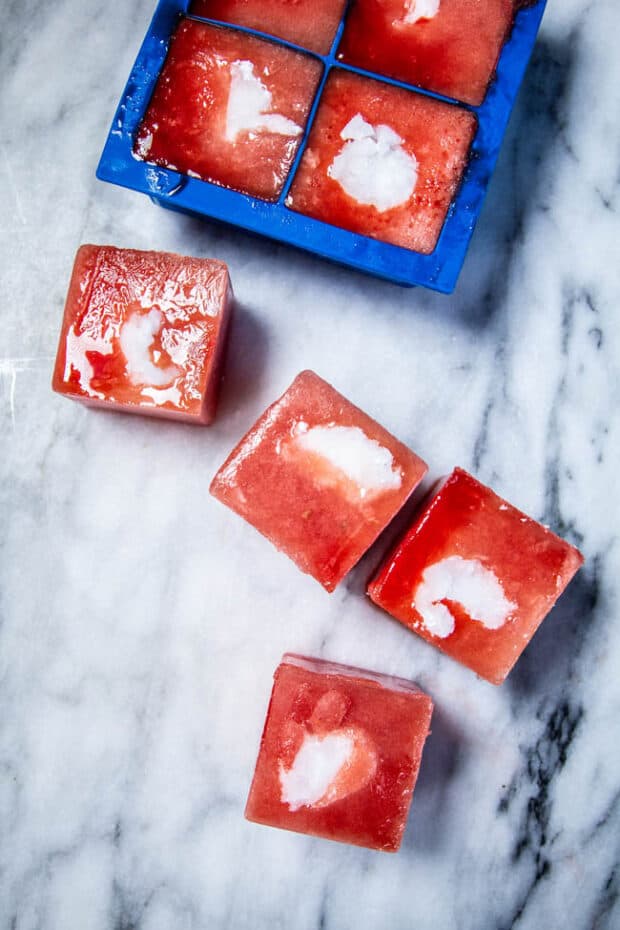
Frozen Watermelon & Coconut Oil Dog Treats
Can dogs eat watermelon? Of course! There are few treats that dogs enjoy better than a sweet, cold chunk of summer melon.
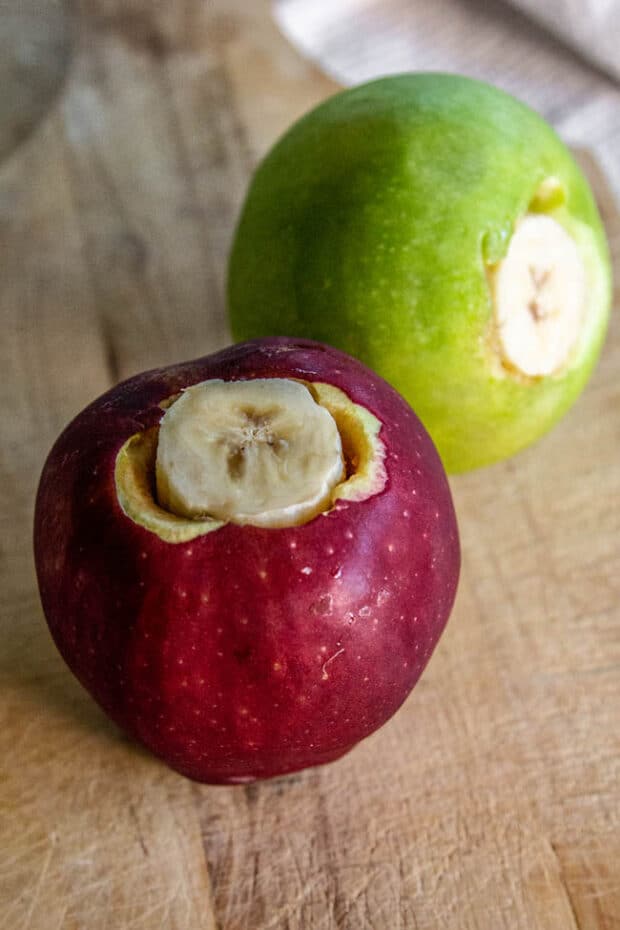
DIY Apple Kong for Dogs
We freeze this apple kong for dogs and offer them to our pit bull mix Rebel when she is bored or we just need to keep her attention held for a few minutes. She literally dances when she sees them come out of the freezer.
The halved banana just slips right down into where the core and seeds were, so it isn't a hard-to-make treat either. As it melts the banana transforms into the consistency of ice cream - creating a lickable melty center to this frozen treat that literally drives her bananas!

Frozen Blueberry & Yogurt Dog Treats
Can dogs eat blueberries?
Blueberries are one of the best fruits that dogs can eat! This flavorful little superfood packs quite a nutritious punch loaded with vitamins, minerals, and other nutrients.

Easy Peanut Butter Dog Treats recipe
This dog treat recipe requires 10 minutes of hands-on time and only 4 ingredients! Trust us when we say that this will be your dog's new favorite treat!
These peanut butter dog treats are simple to make, gluten-free, and full of good for your dog ingredients.
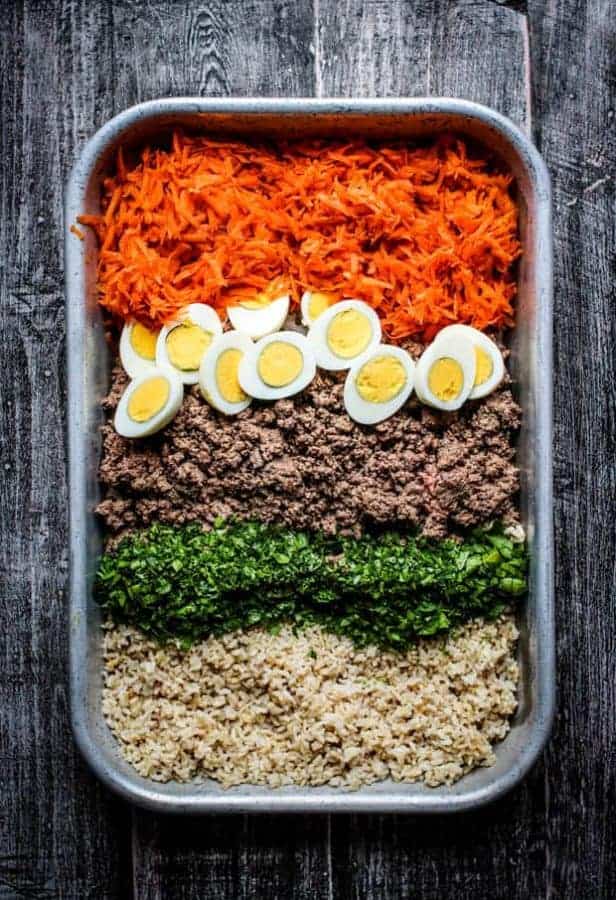
Homemade Dog Food recipe
It's a fact, feeding your pup a diet of 100% human-grade dog food is easy, cost-effective, and WAY better for them than a traditional doggie diet of processed kibble!
This easy homemade dog food recipe combines lean ground beef, wholesome brown rice, fresh vegetables, hard-boiled eggs, and tender herbs for a healthy, vibrant alternative to traditional dog food that has given our 11-year-old dog a new lease on life!




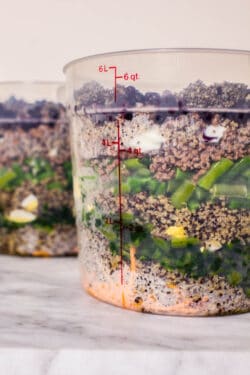

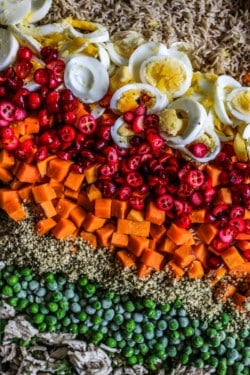
Leah says
How long do these sweet potato treats last if you've baked them vs. dehydating? Do you store them the same way? Is baking more beneficial than dehyrating?
Eliza Clendenin says
Hi Leah! If you bake the sweet potato treats, they'll generally last about a week when stored in an airtight container in the refrigerator. On the other hand, dehydrated sweet potato treats can last up to three weeks, also stored in an airtight container.
As for storage, both baked and dehydrated treats should be kept in a cool, dry place, ideally in the fridge to maintain freshness. If you want to store them for a longer period, you can freeze them for up to three months.
In terms of benefits, both baking and dehydrating are great options. Baking is quicker and can give the treats a softer texture, which is often easier for dogs to chew, especially older dogs. Dehydrating preserves more nutrients and gives a chewier texture that can be good for dental health. Ultimately, it depends on your dog's preference and what works best for you!
Tonia Devereux says
Hi Meg thanks so much for your recipes and ideas. Our little dog Sputnik has been diagnosed with early stage Kidney issues. We have just put him on the Hills KD diet. I am interested in your story and the success with the homemade diet you have given your dog. It was confusing when the vet said a low protein diet but you are giving good quality protein with great results. We love hiking so I want my little dog to still have some muscle mass, this low protein diet is worrying.
Just a question on kibble. So you just give wet food to him and greens for vitamins etc. I guess you keep his teeth healthy with biscuit treats for crunch? Also I realise you are not a vet but Sputnik loves beef jerky, if we just made our own with good quality meat with no added spices and included in his quota for the day, perhaps we could add that in as treats. Would you do that for your dog or is it just too much meat?
Thanks so much it is such a relief to find someone who has documented their journey and shared it.
Tonia Devereux
Summer Dickerhoof says
Sputnik sounds like a sweetie! We have not made my our own beef jerky for the dogs, but to be safe, I would check with your vet and see what the best option is for your pup!
Dede says
I have been fighting a lot with my new puppy. We adopted from a rescue when she was five months old now at one year old we can’t seem to get it straight. She has had eye surgery to flip her eyelids as she had ulcerative corneas right after we got her. She then went to vets with constant itching and overweight. They put her on bland diet as they thought it was allergies. Now they are telling me she possible has kidney disease and may not live another year. I am taking her in for a second opinion. I have been feeding Hills derm complete and adding sweet potatoes, butternut squash, green beans, and no sugar added applesauce. I bought some dog cookies for her which have flour and cinnamon but are pretty bland. Any help I could get to make her diet would be appreciated as I am starting to trust nobody. Thanks
meg@thismessisours says
Oh my goodness Dede! I am so sorry for all that you and your sweet pup have been through. I totally feel you when it comes to not trusting anyone after so much frustration! I believe that getting another opinion would be the first thing I would do too though. Your pup needs a primary care vet and maybe you can find one in your area that can take a look with a fresh set of eyes at the problem.
Our Easy Homemade Dog Food recipe is what we created and exclusively fed our dog after he was diagnosed with terminal stage 4 kidney disease - so start there when it comes to food. It has been 2 years now and he is in full remission. Lots of people seem to have had luck with that recipe. Also, lots of clean, filtered water is key. Ditch the tap water - it has chemicals that can make it harder on the kidneys to do their job. Keep me posted how things are going for y'all! It just breaks my heart to think about all you have been through!
Melissa says
I think your claim that sweet potato skins offer no nutritional benefit is horribly inaccurate. I'm curious where you found that information as most nutritionists will tell you most of the vitamins are in the skin of our veggies.
Paula says
My black lab, loves these. I make them in the oven or the dehydrator. I have been making her food for the past few months and can see such a difference in her. She is only 18 months old but I am so much happier cooking for her. I love your recipes and will be adding them to her weekly recipes for a change in routine.
Thank you for such great recipes
meg@thismessisours says
Oh my goodness Paula, you made my day! I love cooking for our dogs too and the difference in their health and general well being is so evident within a short period of time. Thank you for taking the time to comment and rate the recipe - it means so much!
Cindy Pasant says
Hi, just saw this re: sweet potatoes. My dog, Kimba, also has elevated kidney values & I am struggling with her food choices. We've gone from the vet kibble to a vet scripted fresh cooked frozen retail product. I would very much appreciate it if you could give me any guidance at all as to what actual menu you used for Hooch. I would be so happy to make her meals myself. Thank you, Cindy
George says
My dog loves these so much! And they’re so easy to make!!!
Marlene Fanucchi says
im making his food but need to get some vitamins and minerals from the health store thanks so much
MK says
I was about to get some sweet potatoes for part of homemade food for my dog who has kidney disease until I realized that sweet potatoes actually have a high level of phosphorus, which is to be avoided by people and dogs who have kidney problems. Sorry, but I thought people should know that this is not a recommended food for kidney issues.
meg@thismessisours says
Hi, I understand & appreciate your concern - however, these are approved by our vet for our dog that has kidney disease as they are considerably lower in phosphorous than chews and meat based dog treats and bones. We treat our dog a few of these thin sweet potato slices a day in conjunction with other healthy treats like apple slices.
When our dog was diagnosed with stage 4 kidney disease a year and a half ago they gave him 3-6 months to live. I made all of the changes that are documented here on this site through the recipe posts and he is now not only still here 18 months later - his blood level indicators for kidney disease went from stage 4 to healthy kidney levels.
Julie says
I am looking forward to making theses sweet potato dehydrated treats for my 14year old beagle who was recently diagnosed with stage 2 kidney disease. Just wondering how to store the treats and how long they will last please?
Julie
meg@thismessisours says
Hi!! We use a food dehydrator for ours so they are like thick potato chips when they are fully dried and cooled. As long as they are dehydrated all the way they should keep for about 3 months with zero issues. I have read that after 3 months can start to change color and/or the flavor changes, but I only dehydrate a few weeks worth at a time so we have never had a problem. As far as storage goes - I store mine in a large, old metal popcorn tin and keep it where we treat them with the sweet potato treats. You could store them in a bag too just as long as you can seal the container in between treats.
Maggie says
Oops I wanted to leave 5 stars but it would not let me! Thank you v much. We have a cockerpoo who weighs 11 kg,nand I wondered how much I should give her each day. We raw fed her with an exp high quality raw food, but she contracted ecoli, which vet says has affected her gallbladder, liver, poss pancreatic maybe kidneys. She has blood tests every 3;weeks , goes for scans, and Had a biopsy (which made her v poorly) 3months ago. She has been on antibiotics and Destolit for nearly 6 months and a vet diet from Royal Canine. (I am in uk). Now her bloods show normal and last scan quite good, so she is off antibiotics. I have given her pro and pre biopics during this time ...and milk thistle. We have to wait 3 weeks before more bloods done (not insured anymore ... might as well just hand over my credit card!!) but whatever it takes to keep her healthy we will do. Vet says absolutely no more raw food, quote , prob gave her this bacterial infection. (Cholangitus and pancreatitus on and off...). So I have to find an other low fat, high quality etc food. But I was thinking maybe I do it myself .... in the uk lots of exp companies have started up, prob v good, selling “home cooked” dog food, but I am sure I could if I knew what to do. Anyway, I found you which is great. Please could yiu give some advice cos I feel as if I am walking in treacle at times re her food!! Vet says sticks with Hills, Purina or royal canine ....
meg@thismessisours says
Oh Maggie - your poor pup and poor you!! Raw food can cause serious problems. It has to be monitored so closely, because dogs can suffer from the same types of food poisoning and digestive issues just like us. I hate that you both have had to go through this! When our 11-year old dog fell ill with kidney disease we were prescribed a very expensive rx kibble diet. Our vet preferred the prescription diet in the beginning when I mentioned switching to making Hooch's food, but I went home did more research and listened to my intuition telling me this was what would be best for him.
When he was diagnosed he had blood marker indicators for stage 4 kidney disease with 3-6 months life expectancy. At that time we were doing blood work every 6 weeks. With the rx diet at the first 6 week check there was a very little change in his blood. I introduced homemade food after that on my own and at his next 6 week visit his blood indicators were at stage 1 kidney disease levels! He was regressing!!! So, we kept going, I kept cooking for him, giving him filtered water to drink so here were less impurities and chemicals for his kidney's to flush out and we kept testing him.
Last December was the 1 year anniversary of his "terminal" 3-6 month diagnosis and his blood level indicators for kidney disease were nonexistent! He has normal kidney function levels and has more energy than he has in YEARS!!! I'm not saying you will have the same miraculous results, but if you read through the comments section on our homemade dog food posts you will find lots of other dog owners with stories about how their pups were struggling and they are now doing so much better on real food.
It sounds like both you and your pup have been through the ringer and I am not a vet, so I can't tell you exactly what the best medical course of action is for your dog, but I know what worked for us and I know that I will never ever feed any of our dogs kibble again. Our youngest dog has the healthiest coat and skin you have EVER seen and the vet raves about her vitals and stats at her check ups too. It's worth a shot, for both you and your dog. Just make the transition gradually and see what happens.
Please, keep me posted how you and your dog are doing! I would love to know!
Lecia Thue says
My 15 year old Yorkie has just been diagnosed with CKD. One of her three markers stays elevated unless we give IV fluids bi weekly. Last week I gave sub cutaneous fluids at home four days and the onearker still climbed to the 60s. We have now had two clinic stays for fluids to flush the kidneys and get the blood markers down. She is a picky eater. Yesterday while at the clinic she ate an entire can of the Hills KD food. She will not eat it at home for me. Today she has eaten none of it. She has lost so much weight. I must get her diet right if she is to live longer. I researched sweet potatoes and it seemed the phosphorus was low so I offered it to her cold from the fridge and she ate it up. Foods she use to eat, she won't eat now. If I let her have the foods she will eat, she goes down hill and gets lethargic and then stops eating all together. Can you share the complete diet you worked with. The vet has cautioned me to be careful with the homemade diet but I have to do something. She won't eat the canned food at home. She is skin and bones.
Eliza Clendenin says
I'm so sorry to hear about your Yorkie's condition. It sounds like a really tough situation, and I understand how crucial it is to find the right diet to support her health.
Regarding the homemade diet, it's great that you're exploring options to ensure she eats and stays nourished. Sweet potatoes can be a good choice, as they are low in phosphorus and can be a nutritious addition to her diet. However, I would recommend working closely with your vet or a veterinary nutritionist to create a balanced homemade diet tailored to her specific needs. They can help you design a diet that addresses her CKD while ensuring she gets all the necessary nutrients.
As for the Hills KD food, it can be frustrating when a dog refuses to eat a food that is crucial for their condition. Sometimes, warming the food slightly or adding a small amount of low-sodium broth can make it more appealing. However, since she ate it at the clinic but refuses it at home, it might be worth discussing this with your vet to see if there are any additional tips or alternative options they can suggest.
In the meantime, continue offering the sweet potatoes as a treat or supplement if she enjoys them, but ensure they're part of a balanced diet.
Please keep your vet updated on her eating patterns and any changes in her condition. They might also have additional recommendations or alternatives that could be more effective.
Wishing you and your Yorkie the best. Hang in there, and I hope you find a solution that works for both of you.